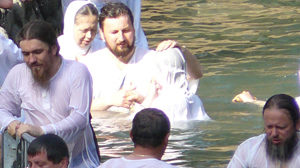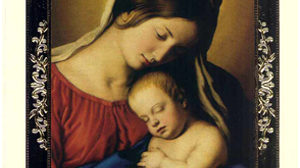The Baptism of the Lord
Isaiah 42:1-4, 6-7
Acts 10:34-38
Luke 3:15-16, 21-22
Reflection:
Today brings the Christmas season to a close. Like most of you, we celebrated Christmas with a bit too much food and drink and a sometimes mind-numbing schedule of visiting, gift-giving, shopping (and then returning). For my family this is the day to strip trees of their ornaments and “un-deck” the halls, to put away Nativity figurines and the once-again tangled sets of lights.
As much as I tried to focus on the “reason for the season” through it all, it is tempting to linger at the crib as more of a spectator than a participant in the story. Not today. As we now leave the manger, we face the fact: Babies don’t stay babies for long (as my children and grandchildren constantly remind me). They and we must grow up. So today, we are focused not on mangers and cute babies, scruffy shepherds and kind kings, but on the waters of life and death, on adult choices and responsibilities, and on the real “reason for the season.” Jesus was born and so are we. The Spirit that rests on Jesus at his baptism is the same Spirit that comes to rest on each of us. Through our baptism, each of us is a child of God, made in the divine image, breathing divine breath and capable of achieving the impossible through God’s grace.
This is the culminating message of the season: Our faith is not merely about honoring Christ through remembering his birth, but accepting the challenge of discipleship, opening ourselves to being baptized not just with water but with the Holy Spirit and with fire. We are to be adult Christians with adult faith. Now more than ever, we need people living out the call of baptism.
I think I will get out my baptismal certificate and reflect on the dreams and hopes my parents had for me that day. Then I will expand my focus and reflect on the dreams and hopes that God has for me. I have been given so much. I pray that through the grace of this feast, rather than returning to my work exhausted from celebrating, I can return to my work renewed in awareness of my responsibility to manifest Christ and be an instrument of God’s loving and healing power. I hope I gain courage to challenge those who discriminate or promote violence based on another’s skin color, culture, religion or political beliefs. I hope that wherever I go I can stop hateful speech in its tracks and refuse to stoop to humanity’s lowest common denominator. I hope I can find ever-new ways to advocate for justice, to abandon gossip, to reach out in mercy and compassion, and to let God’s light shine through me to a dark and weary world.
Today, God says to me and to each one of us “You are my beloved child – in you I am well-pleased!” Our task is to speak those words to those whose ears have grown deaf, and continue the work of Christmas that John and Jesus began so long ago. There is so much to do. Can we start anew today?
Amy Florian is a teacher and consultant working in Chicago. For many years she has partnered with the Passionists. Visit Amy’s website: http://www.corgenius.com/.








